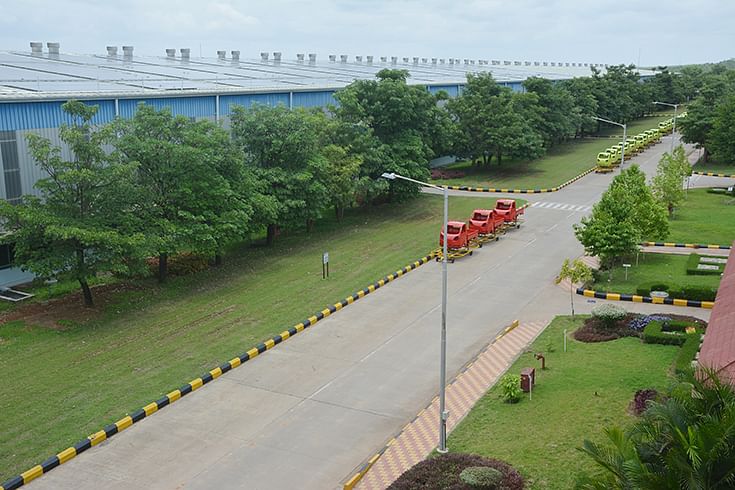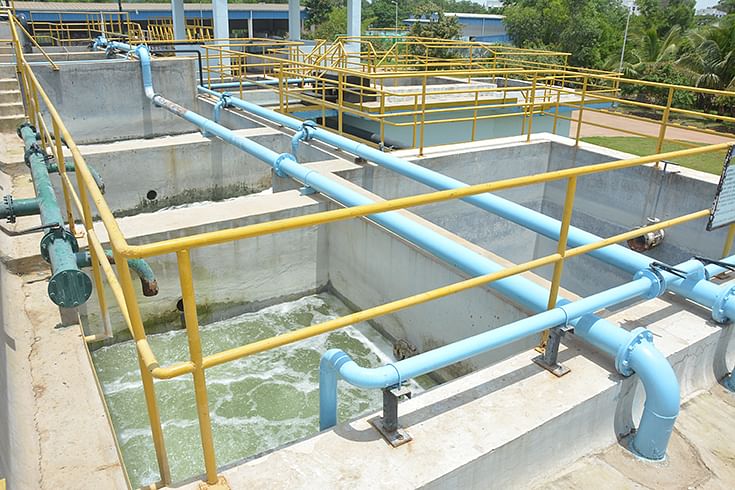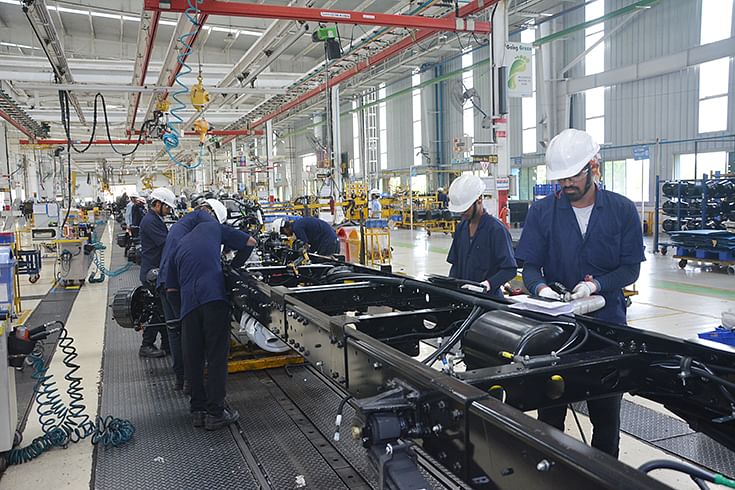Ajoy Lall: 'Sustainable business practices are in Tata Motors' DNA.'
Tata Motors' Dharwad plant is an IGBC-certified operation and has already achieved 100 percent renewable energy.
Tata Motors' Dharwad plant, its youngest manufacturing facility, is an IGBC-certified operation and has already achieved 100 percent renewable energy. Ajoy Lall, Head — Manufacturing, Commercial Vehicles Business Unit, Tata Motors, speaks to Kiran Bajad on the many eco-friendly initiatives at the plant which has an installed capacity of 200,000 CVs and produces the Ace Zip Gold, LCVs and electric buses.
How important is the sustainability drive for Tata Motors?
Sustainable business practices are in Tata Motors' DNA, and the entire credit goes to our founders. To be clean and green is imbibed in our values, right from the day of our company's foundation at Jamshedpur, which is now carried forward for all these decades. Clean, green and lean is our core philosophy in all our manufacturing plants. We are a signatory to Renewable Energy (RE100) global initiative and I’m happy our Dharwad plant has already achieved 100 percent RE. All our other plants are headed towards achieving complete RE.
What are the key factors that helped the Dharwad plant achieve the renewable energy goals?
How will this benefit other plants? Being green and clean was the objective since the Dharwad plant was conceived. Being the newest plant, we could deploy all the learnings from our other plants. Right from the start of construction until vehicle production commenced, all the necessary steps were taken to comply with the IGBC guidelines. This is a unique achievement of the Dharwad plant (pictured below).
The existing green belt at the Dharwad plant plant covers 462,450 square metres. It also houses 95,877 square metres of water bodies.
Zero liquid discharge plant at the Dharwad plant. All landscaped and garden areas have an irrigation system which is fed and sustained by treated effluent and sewage.
All Tata Motors plants work together and we have set ambitious goals. For example, the overarching aim is to reduce energy usage by 30 percent. We are also undertaking innovative projects to meet this target. Therefore, even if the energy cost increases by 20-30 percent, our power bills are going down due to a reduction in usage. Our team has come up with air-conditioning (AC) and air circulators that offer the same temperature and also the air-flow. So now instead of three, one AC and one air-circulator is enough. This innovative idea, put forward by one of our operators in the Pantnagar plant, is now being implemented at all our plants.
All the other Tata Motors plants have been around for decades. How do you see them becoming more sustainable?
Yes, the old plants are running for decades but we keeping try to make them as modern as possible with requisite changes, with new industrial practices. In 2017, the Jamshedpur plant won the award for the highest savings in energy consumption in the Indian automobile sector. Despite being the very first plant, different initiatives across various areas produce superior results. In fact, the older plants sometimes have more headroom and opportunities for improvement than the younger plants.
In 2017, the Jamshedpur plant, Tata Motors' oldest manufacturing facility, won the award for the highest savings in energy consumption in the Indian automobile sector.
What are the near-term sustainability goals Tata Motors is working on?
We have aligned ourselves with United Nations' 21 developmental goals for sustainability. Our efforts in this area are aligned to those covering energy, water, renewable energy and waste management, both in terms of green as well as clean. We have set up cross-functional teams, driven by senior leadership.
Our CSR teams work across communities to help a sustainable lifestyle. We also have balanced score cards, which define the objectives for a year to achieve the sustainable and renewable energy goals. My own performance is evaluated at the end of the year on this basis. This mission further percolates down to each plant manager and their area of work. This is tied up across the organisation and goes up to the business head level. Tata Motors' manufacturing operations encompass small commercial vehicles to heavy trucks, buses and passenger vehicles.
How challenging are the manufacturing complexities?
Yes, this is a challenge but I also believe it is a strength for Tata Motors — such a huge product range which no other manufacturer matches, not only in India but globally too. This strength comes from our skills, knowledge and competencies along with an engineering and research centre. Also, there are some operations which are common across each plant, and we have domain experts who provide the techniques across plants. Therefore, there is a synergy and also uniqueness of each plant in the company.
RELATED ARTICLES
"Connectivity and ADAS will drive the next wave of disruption": Sundar Ganpathi
Tata Elxsi's CTO Sundar Ganapathi on how connectivity, ADAS, and data will define the next wave of automotive disruption...
INTERVIEW- Renault CEO Cambolive: 'India Is Renault' — Targets 3–5% Market Share by 2030
Renault is pursuing a fundamental reset of its India strategy, says brand CEO and Chief Growth Officer Fabrice Cambolive...
INTERVIEW: "EV Demand is Rebounding both in India and Around the Globe" - JLR's Rajan Amba
Jaguar Land Rover India MD Rajan Amba discusses the India–UK FTA, the company’s manufacturing plans, the upcoming Panapa...






 31 Aug 2019
31 Aug 2019
 41861 Views
41861 Views








 Darshan Nakhwa
Darshan Nakhwa


 Hormazd Sorabjee
Hormazd Sorabjee

 Prerna Lidhoo
Prerna Lidhoo

